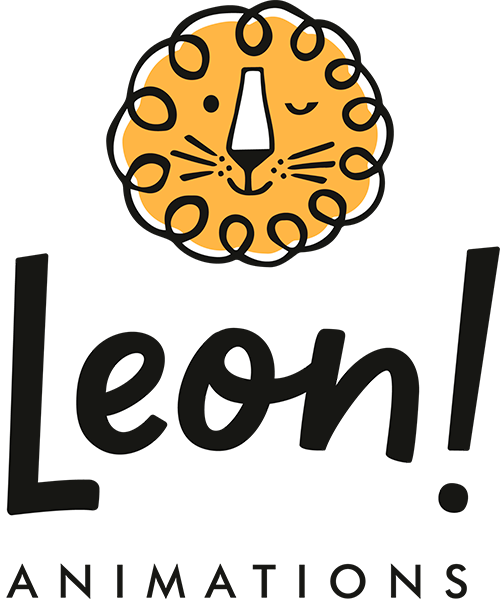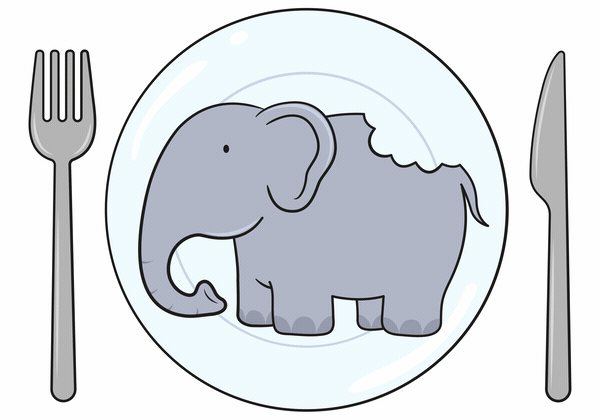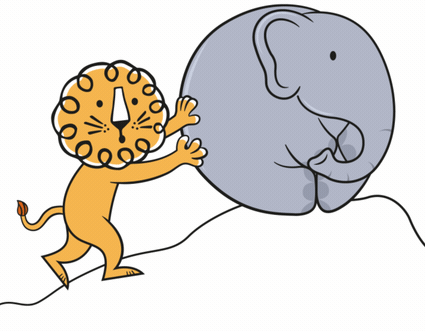Take the 1st Step, Even if it Sucks - Leon! Animation Studio
How do you eat an elephant?
One bite at a time.
Of course, you've heard this before. If you earnestly tried to answer that question at the time without context, you probably struggled for a while. I know that 6-year-old me did.
"How DO you eat an elephant?" My sugar-addled brain wondered. The problem seemed "BIG", and the gears started whirring, but no effective answer came to mind. I think I was about to yell out "Barbeque it" when my Uncle Tim helped me get to the point:
"One bite at a time."
I wasn't impressed at first. I was a little peeved. I'd been expecting something funny, or at least clever, but this was so obvious I'd completely overlooked it. I felt silly, but the point dawned on me as time passed.
Big problems often seem impossible to solve. Indeed, they're usually too much to handle all at once. Kind of like trying to eat an elephant in one bite. But if you take the first step or the first bite- it doesn't matter how big the problem is because you've now simplified it.
Your elephant became a series of several hundred (or thousand) tiny bites, and ANYONE can handle a thousand little bites.
Getting Started Can Help You Deconstruct Your Problems
There's more to getting started than seems at first.
One of the significant advantages that a first step gives you is eliminating the idea of the problem being ENORMOUS. Think back to the last school project you had that was absolutely massive. Or maybe you have a friend who's lost a ton of weight or put on a bunch of muscle.
When it came down to the brass tacks, achievements like those took significant time.
Losing 100 kg isn't a quick process. It's slow, and if your focus is "losing 100 kilos", you'll fail on step 3 every single time. You'll start, have a good week or two, then stumble and give up the first time you face any real adversity.
You'll have been putting so much pressure on yourself to "lose 100 kilos" that a small failure (like having too many slices of pizza) will seem catastrophic. You'll probably then give up and say,
"To hell with it, may as well eat the entire thing."
Now let's reframe that entire scenario but from a different perspective.
If all you were trying to accomplish was losing a single kilo at a time, your goal becomes far more manageable. Your entire focus automatically shifts away from the years of effort it may take to lose that much weight to the comparatively small effort it'll take to make it through a week.
The First Step is Usually The Hardest
In nature, there's a principle called inertia, which describes the tendency of objects to resist change.
Picture a giant boulder sitting at the top of a hill:
It's been there for thousands of years now. It's overgrown and has sunken into the ground a little bit. That rock is effectively your first step on whatever big thing you're tackling right now.
At first, it feels like you need the strength of Hercules to get things rolling. After all, you need to dig the boulder up or push it hard enough to dislodge the dirt and trees that have grown around it.
However, once you get it rolling, that same rock that was impossible to move quickly becomes impossible to STOP as it rolls downhill.
James Clear, in the book Atomic Habits, describes the role of inertia in our habits and approach to problem-solving. Often, no matter strange a habit may seem, it's easier to keep it than to start it.
Our habits become reinforced and entrenched in us over time. A visual representation of our habits, like X's on a calendar to show days in a row we've accomplished our task, ingrains these new habits in us even quicker.
None of this matters, though, if you don't take the first step.
So what's James' approach to taking the first step?
Make it a teeny tiny habit. Sort of like biting off a little piece of the Elephant.
Around this part of the book, James describes a man who lost over 100 kg in weight. He showed up at the gym for 5 minutes every day for a few months. At first, the man did nothing. He walked in, stood in the gym and left.
Once showing up was a habit, he expanded to attempting a single set and made that a practice. Then two sets. Then three, and pretty soon, he worked out every day. His effort to take a single, tiny first step- resulted in him transforming his entire life.
At Leon! Animations, we apply this philosophy in everything we do. It's rare for us to get stumped on an animation, but if we do, we handle it exactly like we'd handle THE elephant. In business, the outcome you're trying to help your clients achieve is like the Elephant.
There are a million little bites, and your 2D explainer animation is the first of many. If you need a "first bite" done, why not drop us a line by clicking on the image below?
Discover all 10 of our Simplification Commandments: 1) What's the 1st Step?, 2) Knowledge = Powah!, 3) Explain to Toddlers, 4) eXpEriMenT!, 5) Devil's Advocate, 6) Steal Sh*t!, 7) Take a Brake!, 8) Change Goals, 9) Give Up!, and 10) Ask for Help.
Our animation studio services for charities and healthcare organisations use these same principles to transform complexity into crystal-clear explainer videos.









